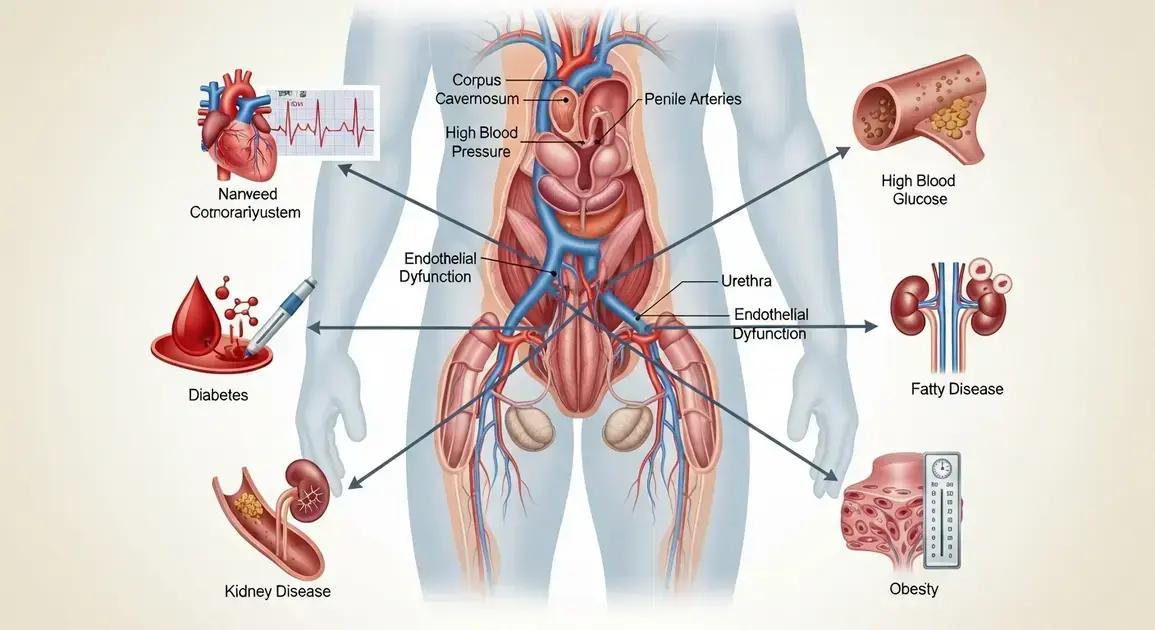A disfunção erétil se torna mais comum após os 40 anos devido a uma combinação de fatores físicos, como doenças cardíacas e diabetes, e psicológicos, como estresse e ansiedade. Para preveni-la, é importante manter um estilo de vida saudável e se comunicar abertamente com o parceiro. Tratamentos incluem medicamentos, terapia e dispositivos específicos, que podem ajudar a restaurar a função erétil e melhorar a qualidade de vida sexual.
Erectile dysfunction (ED) affects many men, especially those over 40. As men age, various factors contribute to this condition, including physical health issues, psychological stress, and lifestyle choices. In this article, we will delve into the reasons why erectile dysfunction becomes more common in this age group, exploring both medical and emotional aspects. Understanding these factors is crucial for effective treatment and maintaining healthy relationships.
Understanding Erectile Dysfunction
Erectile dysfunction (ED) is a condition characterized by the inability to achieve or maintain an erection suitable for sexual activity. This issue is not just a physical concern; it can deeply affect emotional well-being and relationships.
What Causes Erectile Dysfunction?
Understanding the underlying causes of ED is essential. Many factors can impact erectile function. Some common causes include:
- Health Issues: Conditions like diabetes, high blood pressure, and heart disease can affect blood flow and nerve function, leading to ED.
- Hormonal Imbalances: Low levels of testosterone, the male sex hormone, may result in decreasing libido and erectile difficulties.
- Medications: Certain prescriptions can have side effects that interfere with erectile function, such as antidepressants and some blood pressure medications.
The Psychological Aspect
ED is often linked to psychological factors. Stress, anxiety, or depression can significantly impact sexual performance. Men may fear failure, which can create a cycle of anxiety that further worsens the condition.
It’s important to recognize that ED can affect men physically and emotionally. Seeking help is a crucial step towards improving one’s overall quality of life.
Physical Causes of Erectile Dysfunction

Many men experience erectile dysfunction (ED) due to various physical causes, especially as they age. Understanding these underlying health issues is crucial for addressing and managing this condition.
Cardiovascular Diseases
Conditions that affect the heart and blood vessels can significantly impact erectile function. A decrease in blood flow to the penis can result from:
- High blood pressure: This condition can damage blood vessels, limiting blood flow necessary for an erection.
- High cholesterol: Elevated cholesterol levels can lead to atherosclerosis, a narrowing of the arteries that decreases blood flow.
Diabetes
Diabetes is a major factor contributing to erectile dysfunction. High blood sugar levels can damage nerves and blood vessels, leading to a lack of sensation and reduced blood flow.
Hormonal Imbalances
Hormonal issues can play a significant role in ED. Decreased testosterone levels, often a result of aging or testicular issues, can reduce sexual desire and performance.
Neurological Disorders
Conditions that affect the nervous system can hinder signals between the brain and the penis. Disorders like multiple sclerosis, Parkinson’s disease, and spinal cord injuries may lead to ED.
Medications
Many common medications have side effects that can contribute to erectile dysfunction. Some examples include:
- Antidepressants: Certain medications used to treat depression can impact sexual function.
- Antihypertensives: Drugs for high blood pressure may reduce sexual drive or cause erectile issues.
Identifying these physical causes is the first step toward finding effective treatments for erectile dysfunction.
Psychological Factors Involved
Psychological factors play a pivotal role in erectile dysfunction (ED), particularly for men over 40. Mental health can directly influence physical health, making it essential to understand these connections.
Performance Anxiety
One common psychological factor is performance anxiety. Many men fear not being able to perform, which can lead to stress and make the problem worse. This cycle can hinder sexual arousal and erection.
Depression
Men dealing with depression often experience a decrease in libido and energy levels. This feeling can contribute significantly to difficulties in achieving or maintaining an erection.
Stress
Life stressors, whether from work, finances, or personal relationships, can distract and overwhelm. Chronic stress impacts hormone levels and can lead to ED.
Relationship Issues
Conflict or poor communication with a partner can also contribute to psychological barriers to sexual function. Feeling disconnected or insecure in a relationship may lead to erectile difficulties.
Self-Esteem
Men struggling with self-esteem may find it hard to be intimate. Poor body image or feeling inadequate can create additional pressure, impacting erectile performance.
Addressing these psychological factors is critical, as they often intertwine with the physical aspects of erectile dysfunction, highlighting the importance of a holistic approach to treatment.
Impact on Relationships

Erectile dysfunction (ED) can have a significant impact on personal relationships, especially for men over 40. The emotional and physical aspects of this condition can create tension and misunderstandings between partners.
Communication Breakdown
When ED occurs, it may lead to a lack of open communication. Men might feel embarrassed or ashamed, causing them to withdraw from their partner. This can lead to feelings of frustration and alienation for both individuals.
Emotional Distance
As intimacy diminishes due to erectile dysfunction, couples might feel emotionally distant. This can strain the bond, leading to resentment and lack of support in other areas of life.
Trust Issues
Partners may start questioning their relationship, leading to trust issues. A partner struggling with ED may feel inadequate, while their significant other may wonder if they are not desirable anymore.
Impact on Intimacy
Intimacy is crucial for a healthy relationship, and ED can severely impact this area. Couples may find themselves avoiding physical closeness altogether, leading to further complications in their connection.
Seeking Help Together
It’s vital for couples experiencing ED to address the issue as a team. Seeking therapy or counseling can help both partners understand the emotional challenges involved and rebuild their intimacy. Open dialogue about the situation can foster understanding and support.
Preventive Measures and Treatments
Preventive measures and treatments for erectile dysfunction (ED) are essential for maintaining not just sexual health but overall well-being, especially as men age past 40.
Healthy Lifestyle Changes
Adopting a healthier lifestyle can significantly reduce the risk of ED. Important changes include:
- Regular Exercise: Physical activity improves blood circulation and heart health, which are vital for sexual function.
- Balanced Diet: Eating a diet rich in fruits, vegetables, whole grains, and lean proteins can promote healthy vascular function.
- Avoiding Smoking and Excessive Alcohol: Smoking can impair blood flow, while too much alcohol can decrease sexual arousal.
Medical Treatments
For those experiencing ED, various treatment options are available:
- Medications: Prescription drugs like Viagra or Cialis improve blood flow to the penis, helping achieve an erection.
- Therapy: Counseling can address underlying psychological issues such as anxiety or depression that contribute to ED.
- Pump Devices: Vacuum erection devices can create an erection by drawing blood into the penis.
Regular Check-ups
Routine medical check-ups can help identify and manage health issues early. Monitoring blood pressure, cholesterol levels, and blood sugar can prevent conditions that lead to ED.
Open Communication with Partners
Communicating openly with partners about sexual health and any concerns can help in finding supportive solutions together. It strengthens relationships and reduces anxiety.
Understanding and Addressing Erectile Dysfunction
Erectile dysfunction is a complex issue that can impact many areas of a man’s life, particularly after the age of 40. Understanding the causes—from physical and psychological factors to its effects on relationships—can empower men to seek help and find effective treatments.
By adopting a healthy lifestyle, seeking medical advice, and maintaining open communication with partners, men can take proactive steps to manage or prevent ED. Taking charge of their health is vital for overall well-being and can lead to improved quality of life and intimacy.
Ultimately, addressing erectile dysfunction is not just about physical health; it’s about emotional connection, confidence, and fulfilling relationships.
FAQ – Perguntas frequentes sobre disfunção erétil após os 40 anos
O que é disfunção erétil (DE)?
A disfunção erétil é a incapacidade de conseguir ou manter uma ereção suficiente para relações sexuais satisfatórias.
Quais são as causas mais comuns da disfunção erétil em homens acima de 40 anos?
As causas podem incluir problemas de saúde como diabetes e doenças cardíacas, fatores psicológicos como estresse e ansiedade, e efeitos de medicamentos.
Como a disfunção erétil afeta relacionamentos?
Pode causar dificuldades de comunicação, distanciamento emocional e confiança, impactando a intimidade entre parceiros.
Quais medidas preventivas podem ser adotadas contra a disfunção erétil?
Manter um estilo de vida saudável, como alimentação equilibrada e exercícios regulares, evitar tabaco e álcool, e realizar check-ups médicos regulares.
Que tratamentos estão disponíveis para a disfunção erétil?
Tratamentos incluem medicamentos prescritos, terapia, dispositivos de ereção a vácuo e mudanças no estilo de vida.
É importante falar sobre disfunção erétil com o parceiro?
Sim, a comunicação aberta pode fortalecer o relacionamento e ajudar a encontrar soluções eficazes.













